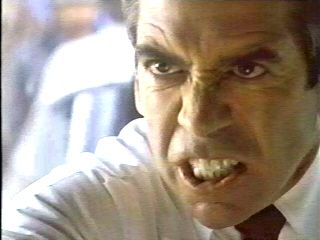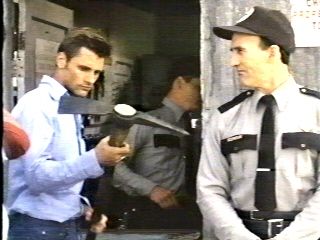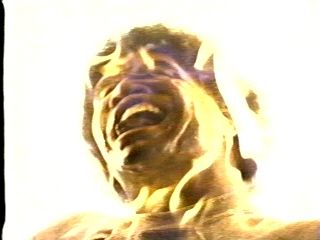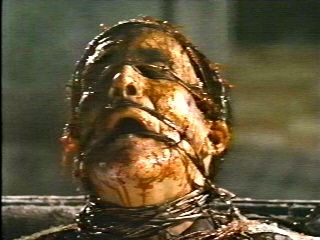
|
|
|
|
|
|
|
|
|
|
|
|
|
(1988) Director: Renny
Harlin
If you are an aspiring filmmaker, but the film industry
in your country is run by government bureaucrats who don't understand
that culture includes popular culture, and instead believe that every
movie should be chock-full of high art, what should you do? Meekly go
along? Fight the bureaucracy? Struggle to make your movie by yourself
with limited funds and resources? Since you have probably figured out where the movie takes place, on with the description of the plot. Overcrowding and cutbacks to the Wyoming prison program forces the state's prison board to reopen the old Creedmore penitentiary, shut down twenty years earlier. Appointed to run the reopened penitentiary is Sharpe (Smith, Lois And Clark), a hard-lined warden who used to be a guard at Creedmore years earlier. Walker (Field), a reform-minded member of the prison board, objects to Sharpe's posting, not just because of his archaic ways, but that she suspects that he hides much more than he allows to be revealed - something that fearful and newly-arrived lifer prisoner Cresus (Lincoln Kilpatrick, Matt Houston) seems to agree with for reasons of his own, having been in Creedmore years earlier with Sharpe. On the other hand, the other newly-arrived prisoners - including professional car thief Burke (Mortensen, The Lord Of The Rings), proud Italian-American "Lasagna" (Ivan Kane, Platoon), and hulking giant "Tiny" (former wrestler Tom "Tiny" Lister) - are more concerned with adjusting to the horrendous condition of the prison as well as the harsh disciplinary environment Sharpe has put into effect. But they soon find themselves involved in something more pressing; immediately after the old execution chamber is unsealed, unnatural (and deadly) things immediately start plaguing the prison, with no one seemingly safe from it all. And it all seems tied to that secret Sharpe and Cresus share... Although Prison can unarguably be
called a horror movie, there is actually a lot of effort put into
elements that are not of a horrific nature. That is, at least, horrific
The background atmosphere given to Prison makes the title spot a great and somehow appropriate place to set a horror movie. It's actually the previously mentioned characters that really carry the story along, though the construction of the characters and the performances of the actors who play them has somewhat mixed results. First, the positive. Every prison movie needs a tough warden (at least the ones that at least flirt with exploitation), and Smith gives such an intense performance that it should become a standard. He is incredibly menacing as the warden; when you see the angry look on his face when he grabs the collar of a prisoner who tried to escape, you are certain that he is going to commit murder. Yet the screenplay - and Smith, for that matter - refuses to make the warden a one-note stereotype. There are several scenes when Sharpe is alone and lets down his guard so we can see there is more going on in his head than rage. One scene where he's alone in the execution chamber seems to suggest he feels some deep guilt about something that happened. Also, we see that he is genuinely frightened about what is going on in his prison, so it's more understandable why Sharpe seems to become more berserk as the movie progresses. Another excellent performance comes from Kilpatrick as the prisoner who shares Sharpe's secret, and gives off the same feeling of fear and dread. He has the bonus of playing a somewhat familiar part with a few eccentricities (being addicted to Lysol, for example), and has a great monologue where he tiredly pleads with newcomer Burke to straighten his life. Burke, played by Mortensen, on the other hand isn't as
memorable a character, despite the fact that he more or less becomes
the hero of the movie. Judging from his performance here, it's hard to
believe Mortensen managed to work his way up to a high class project
like Lord Of The Rings. The only other use Field's character seems to have in Prison is in a couple of ridiculous sequences when the macabre wraith contacts her in cryptic ways in her motel room in order to give her a few clues - which doesn't make sense when you think about it. How could this wraith track her down to her motel room, and why did it decide to contact this woman? For that matter, why would such a malevolent force bother to tell someone what's going on and what is going to happen? Equally silly is the final minute of the movie, where the evil force finally reveals its actual physical being in a sequence that supposed to be a big shock - but it looks so silly in its physical state that you can only laugh at the sight of it. But aside from those three moments, the movie is actually pretty successful in delivering the chills, even managing to be genuinely frightening at times. Though Harlin was working with a low budget, there are a few amazing effects sequences that I simply cannot figure out how he did, the most memorable being when the door and walls of the solitary cell an unlucky prisoner is in turn bright red with intense heat in a matter of seconds. The make-up effects are also convincing; though the body count of the movie is actually nowhere as high as you might think (the first victim of the wraith finally happens after about half an hour has passed), the quality of these victims is at the top of the class, with burned and mangled bodies on display that look so utterly disgusting that I wouldn't be surprised if they had to do some trimming in order to get an R rating. Though the effects are great, what really makes the
movie good and creepy are a number of low-tech ways Harlin uses to
suggest horror and build a genuinely creepy feeling. Instead of
complicated special effects, the force of the wraith and its
Check for availability on Amazon (VHS) See also: Destroyer, The Sender, Slaughterhouse Rock |
 No - the correct
answer is to humiliate the bureaucrats by moving to Hollywood and
becoming successful making real movies. Thanks to people like
James Cameron, Canadians really are kings of the world when it comes to
their humiliation of the filmmaking environment they decided they
couldn't work under (though even after decades of this, the Canadian
government is still mighty slow to catch on.) But it does occasionally
happen with individuals from other countries. For example, the
Dutch-born Paul Verhoeven (Robocop) packed up and left
after years of frustrating battles with his government. Then there is
the Finnish-born Renny Harlin. After struggling a long time to make a real
movie (the Finnish/U.S. Born American),
and the reaction of his government to the finished product (they banned
it), Harlin understandably gave up on Finland and moved to Hollywood.
Within several years, he was on the Hollywood A-list with movies like Die
Hard 2 and Cliffhanger. Of course, he had to
start at a lower level than that; his first Hollywood effort was in
fact the low-budget independent horror movie Prison. The
strange thing is despite its unfancy pedigree (including the fact it
was produced by Charles Band), it happens to be one of Harlin's best
efforts to date.
No - the correct
answer is to humiliate the bureaucrats by moving to Hollywood and
becoming successful making real movies. Thanks to people like
James Cameron, Canadians really are kings of the world when it comes to
their humiliation of the filmmaking environment they decided they
couldn't work under (though even after decades of this, the Canadian
government is still mighty slow to catch on.) But it does occasionally
happen with individuals from other countries. For example, the
Dutch-born Paul Verhoeven (Robocop) packed up and left
after years of frustrating battles with his government. Then there is
the Finnish-born Renny Harlin. After struggling a long time to make a real
movie (the Finnish/U.S. Born American),
and the reaction of his government to the finished product (they banned
it), Harlin understandably gave up on Finland and moved to Hollywood.
Within several years, he was on the Hollywood A-list with movies like Die
Hard 2 and Cliffhanger. Of course, he had to
start at a lower level than that; his first Hollywood effort was in
fact the low-budget independent horror movie Prison. The
strange thing is despite its unfancy pedigree (including the fact it
was produced by Charles Band), it happens to be one of Harlin's best
efforts to date. in the ways we
normally associate with horror movies. Instead of bombarding the viewer
with relentless efforts to shock, the movie goes to the trouble to show
us how horrifying the prison setting is even when these mysterious
things are not happening. Shot on the grounds of an actual abandoned
penitentiary, there is immediately a degree of authenticity to be felt
in the movie. The production wisely didn't clean things up before
shooting, and sights such as the weed-choked exercise yard and the
filthy cold concrete cells the prisoners are crammed in make the
setting a true hell on earth. It seems to be a place that any man could
find themselves in with a wrong decision or even a little bad luck.
Unlike other prison movies that are filled with young and muscular
convicts, the hundreds of prisoners milling around in the background of
this movie are a mixture of different types; the young and old, the
hairy and balding, the fat and thin, and some wearing eyeglasses. Much
more believable. They wearily go from place to place, clearly worn out
from so much hard time and being without free choice for so long. The
prison guards that order them around are also clearly worn from their
stint in the prison system. They are too tired and downbeat to be the
stereotypical sneering and nightstick-beating stereotype. Most of them
have a hatred for the convicts, but they only have the energy to be
cruel to them by throwing insults.
in the ways we
normally associate with horror movies. Instead of bombarding the viewer
with relentless efforts to shock, the movie goes to the trouble to show
us how horrifying the prison setting is even when these mysterious
things are not happening. Shot on the grounds of an actual abandoned
penitentiary, there is immediately a degree of authenticity to be felt
in the movie. The production wisely didn't clean things up before
shooting, and sights such as the weed-choked exercise yard and the
filthy cold concrete cells the prisoners are crammed in make the
setting a true hell on earth. It seems to be a place that any man could
find themselves in with a wrong decision or even a little bad luck.
Unlike other prison movies that are filled with young and muscular
convicts, the hundreds of prisoners milling around in the background of
this movie are a mixture of different types; the young and old, the
hairy and balding, the fat and thin, and some wearing eyeglasses. Much
more believable. They wearily go from place to place, clearly worn out
from so much hard time and being without free choice for so long. The
prison guards that order them around are also clearly worn from their
stint in the prison system. They are too tired and downbeat to be the
stereotypical sneering and nightstick-beating stereotype. Most of them
have a hatred for the convicts, but they only have the energy to be
cruel to them by throwing insults. He is incredibly
vanilla bland, whether he's being confronted by a Bubba-like prisoner,
or trying to escape from the evil wraith that has enveloped the prison.
His unemotional state ends up transforming him into some kind of
holier-than-thou snot, making him quite an annoying hero. It doesn't
seem to then make sense why this guy then occasionally breaks out of
his seemingly selfishness to help someone. In his defense, Mortensen's
character is just as blandly sketched by the screenplay, revealing to
him as well as us virtually nothing about this guy Burke. Having an
even more thankless role to play is Field, as the prison board member
who starts investigating the strange events and history of the prison.
Field does give it a good shot, but she is limited by the fact her
character is more of a plot device than an actual character. About the
only thing positive about the way this character has been written is
that it totally avoids the expected subplot of her falling in love with
this handsome bland prisoner. She only seems to be there mainly so the
movie can do what it seems it can't do on its own - provide a way to
explain the wraith plaguing the prison and how it ties in with the
warden's secret.
He is incredibly
vanilla bland, whether he's being confronted by a Bubba-like prisoner,
or trying to escape from the evil wraith that has enveloped the prison.
His unemotional state ends up transforming him into some kind of
holier-than-thou snot, making him quite an annoying hero. It doesn't
seem to then make sense why this guy then occasionally breaks out of
his seemingly selfishness to help someone. In his defense, Mortensen's
character is just as blandly sketched by the screenplay, revealing to
him as well as us virtually nothing about this guy Burke. Having an
even more thankless role to play is Field, as the prison board member
who starts investigating the strange events and history of the prison.
Field does give it a good shot, but she is limited by the fact her
character is more of a plot device than an actual character. About the
only thing positive about the way this character has been written is
that it totally avoids the expected subplot of her falling in love with
this handsome bland prisoner. She only seems to be there mainly so the
movie can do what it seems it can't do on its own - provide a way to
explain the wraith plaguing the prison and how it ties in with the
warden's secret. feeling of it drawing
near is more easily depicted by the use of tones on the soundtrack
slowly building in volume, mixed in with more familiar noises like
crashings and grindings, and lighting the sets at the right moments
with spotlights shining colors of a striking hue. This may not sound so
spectacular described here in writing, but it works onscreen, probably
because Harlin displays it without any sense of irony or humorous
viewpoint. And the reactions of the actors facing this horror display
the same seriousness; these characters really do seem to be genuinely
frightened at times. Since the horror in this movie is displayed with
the utmost seriousness, it's much more frightening than it could be in
another movie, because here it almost seems as if it could
happen. After all, the most frightening personal experiences we
remember don't seem to have anything cheesy or jokey about them - they
are more "real" to us than even our most pleasant memories. It's also
an explanation as to why Prison stuck in my head for
so long after I first saw it, while all those other horror movies
lighter in tone I saw at the same time soon became a hazy memory.
feeling of it drawing
near is more easily depicted by the use of tones on the soundtrack
slowly building in volume, mixed in with more familiar noises like
crashings and grindings, and lighting the sets at the right moments
with spotlights shining colors of a striking hue. This may not sound so
spectacular described here in writing, but it works onscreen, probably
because Harlin displays it without any sense of irony or humorous
viewpoint. And the reactions of the actors facing this horror display
the same seriousness; these characters really do seem to be genuinely
frightened at times. Since the horror in this movie is displayed with
the utmost seriousness, it's much more frightening than it could be in
another movie, because here it almost seems as if it could
happen. After all, the most frightening personal experiences we
remember don't seem to have anything cheesy or jokey about them - they
are more "real" to us than even our most pleasant memories. It's also
an explanation as to why Prison stuck in my head for
so long after I first saw it, while all those other horror movies
lighter in tone I saw at the same time soon became a hazy memory.